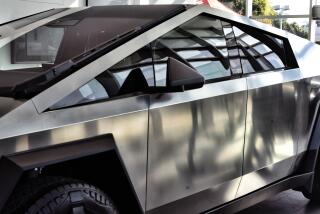Tesla shares continue to fall on report of battery fire in Model S
Shares of electric car company Tesla Motors continued to fall Thursday after pictures and video of a mysterious Tesla Model S fire circulated on the Internet.
The fire raised concern the popular luxury car -- Tesla is selling all it can make -- might have some sort of flaw with its lithium-ion battery system that could be costly to fix or would spook potential buyers.
“While car fires are typically not newsworthy, we expect this incident to gain heightened scrutiny as NHTSA (National Highway Traffic Safety Administration) and other agencies look to understand how the safety of EVs can be ensured,” wrote Wedbush Securities analyst Craig Irwin in a report to investors.
Tesla shares were down another 4% to $173.51 after falling 6% Wednesday. Still, Tesla has seen a huge run-up in its stock this year, as it has ramped up sales of its luxury electric cars. The stock traded at just above $35 on Jan. 2.
Irwin said he doesn’t think the fire will have long-term consequences for the Palo Alto auto company and expects the stock to bounce back to $180.
“Most of the current Model S buyers are either technology savvy early adopters or environmentally conscious consumers with thick wallets, and we believe both groups will already understand the risks of a lithium fire and likely calibrate this recent event as of relatively minor importance,” Irwin wrote.
However, he believes Tesla will look closely at the incident, which probably will influence vehicle design as the automakers works to develop a car that will cost about $35,000 and sell in far greater numbers than the Model S, which starts at about $70,000. Tesla expects to sell about 20,000 of the hatchbacks this year.
Tesla confirmed Wednesday one of its cars caught on fire after the driver struck unidentified metal debris on a Seattle roadway.
The crash caused “significant damage to the vehicle,” Tesla said, adding the car’s alert system signaled a problem and instructed the driver to pull over safely. No one was injured.
A fire then caused “substantial damage” to the front of the vehicle. Tesla said the design and construction of the vehicle and battery pack limited the spread of the fire, which was extinguished by the local fire department.
Safety officials have been tracking fires in electric cars, as well as computers and other equipment, out of concern the lithium-ion battery systems might be fire-prone.
This year, federal regulators grounded Boeing 787 planes for four months after batteries on two planes overheated, with one catching on fire. Boeing ordered modifications to the jets to increase ventilation and insulation near the batteries, but the company and investigators never determined the root cause of the overheating.
Last year, the Chevrolet Volt plug-in hybrid came under increased scrutiny when a series of fires ignited after test crashes of the vehicle. General Motors Co. said the fires were caused by a coolant leak and short circuit that occurred when the car’s battery pack was punctured during severe side test crashes by the NHTSA. GM has subsequently modified the vehicles to prevent the problem.
Follow me on Twitter (@LATimesJerry), Facebook and Google+.
ALSO:
Toyota to export U.S.-built Corollas
Cars’ safety systems are getting a whole lot smarter
Drivers ignoring child seat and seat belt rules are killing children







